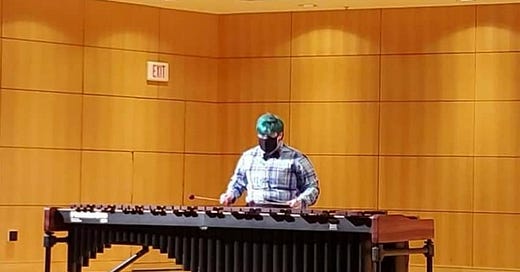One Year Ago Today: Autism, Percussion, Motor Skills and Central Coherence
Here's a reflection I wrote a year ago today on Facebook, based on my own experiences. I'll add some updates as well in italics, based on what I've learned.
Another thing I'm learning by writing this paper and looking at the research is how inter-connected all of the traits of autism are, and why I have so much trouble with the things I do.
Multiple studies have shown a strong positive correlation between deficits in motor skills and deficits in social/communication skills in autistic people.
Then I was trying to break down into words all the components you need to execute a full stroke on a snare drum. It was probably a dozen plus separate components, and I was wondering why it has taken me such a long time to learn snare technique. Well if you're thinking about a dozen plus things at once, that's no way to learn. Well, why am I thinking about a dozen plus things at once when I practice? Because I'm not good at central coherence.
Central coherence is the act of taking in information in a big picture, rather than small details. It's why autistic people disproportionately struggle with processing speed and reading comprehension compared to someone with otherwise matched intelligence test scores. Taking in 20+ things at once instead of one big picture is a lot to process for any brain, especially one that has so many synapses (connections between neurons) firing all the time, which is the predominant theory of how autistic brains work.
So when I struggle so much with snare technique, I always assumed it was just a matter of motor skills, until tonight I realized it was a matter of both motor skills and central coherence.
The coolest part of this paper so far, by far, has been using the information I find to learn more about how my own autistic brain works, and by developing better teaching techniques, I'm inadvertently giving myself better learning techniques.
One Year Later Reflection
Not every single autistic person struggles with motor skills, obviously, but it’s a pretty common factor amongst autistic people. For example, one thing that’s very different in me compared to others is the way I hold a pencil. I use four fingers to control the pencil instead of three. Everyone always comments on how neat my handwriting is when I’m writing something to be read rather than scribbled down for my own notes, and I think a huge part of that is using four fingers to control the motion of the pencil. I’m not really sure if anyone ever tried to correct me, I don’t remember them doing so, but now I have pain in my hands from pressing down too hard. Another thing different is I often lift my toes when I walk and so you can see holes or pressure spots in my old sneakers from where my big toe has applied continuous pressure to the top of the shoe (usually sneakers).
And then of course I’d struggle with central coherence! When I was in early elementary school and started reading chapter books, I could understand the words on the page but couldn’t really understand what they meant, especially in a fiction context. My reading comprehension was far below my ability to read the words on the page. As a result, I hated reading time. I’d rush through books because I just wanted to be done. To me, the words existed in their own context rather as a larger part of a story. I could list ten things that happened in the chapter, but I couldn’t tell you the main idea of the chapter. I often instead resorted to reading non-fiction books: cookbooks, encyclopedias, you name it, where you didn’t have to understand the main idea. As time progressed, I was able to better hide my inability to understand what I was reading, plus use tricks like just repeating something from the first or last paragraph of the chapter to get teachers off my back. I still don’t read a whole lot, especially fiction. I do well with short articles, as well as nonfiction reflections, but my mind draws a blank when it comes to fiction books.
Of course, knowing all this, and reflecting on my own childhood and habits I’ve carried into adulthood, now I know why I struggle, and you’d know why I struggle with motor skills when it comes to percussion! But a lot of people don’t really pick up on those things or only see me in a context of a percussionist instead of a whole person. That’s something I try to do with myself, is be patient and view myself as a whole person. But I think if more people were willing to take the time to understand their students as whole people, even outside a disability context, they’d understand the specific struggles students were having and why they were having them, and that would help teacher and student solve issues more quickly together.



